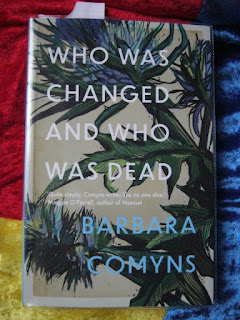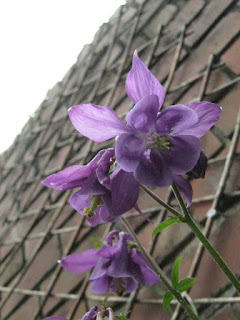I took back to the library 'Everybody died, so I got a dog' because it was tedious and 'Hurricane Season' because it was too violent, but I knew I would love 'A Line Made by Walking' by Sara Baume because I read 'Spill, Simmer, Faulter, Wither' six years ago (almost exactly). In that book she was plainly fascinated by death and dead things, and in this one Frankie is similarly interested. Frankie has had some kind of minor breakdown and retreats to her deceased grandmother's mouldering house to gather her thoughts."I knock the mud from my boots against the doorstep, lever them off with the mahogany shoehorn. I never used a shoehorn before I came here; I never needed one. But nowadays I deliberately leave my boots half-laced so have no choice but to ram the tiny paddle down and shovel up my heel. It's a way of nodding to her customs, of recreating the rituals of her day. I find my grandmother in the shoehorn, and again, as I wash my hands, I find her in the kitchen windowsill curios. In a row above the draining board, there's a weathered wood St Joseph, a plastic flamenco dancer, a three-legged camel, a panda-bear-shaped pencil sharpener, an oblong pebble painted with the features of a mouse and each one of these onlooking objects are immeasurably precious to me, because my grandmother can be found in them."
"And every time I ate a banana, I had to ask it a question. It was a trick Mum showed my sister and me when were were kids. We'd ask the banana something with a straightforward yes/no answer, then she'd chop the very tip off with a sharp knife to reveal a black shape that was either a clear Y or an indistinguishable smudge which stood for no. Of course she couldn't possibly have predicted I'd become obsessed with the wisdom of banana skins. Over and over, I turned to them to settle arguments with my conscience; I obeyed the Y or smudge irrespective of sense, of consequence." (p.80-81)
Frankie takes photographs of dead things, pictures that are reproduced in the book, but she doesn't kill things:
"Only once in all my driving years have I created my own piece of roadkill: it was early autumn, the height of the harvest season. It was pecking spilled grain from the tarmac, and I must have been concentrating on something else or not concentrating at all, because my unthinking instinct was to accelerate. I hope that I also unthinkingly assumed the pigeon would fly away safely before I reached it, that it's untimely death was no more than a tragic miscalculation. I'd like to believe, as everyone does, that I am innately good; innately wired to do good.
But maybe I innately wanted to see the pigeon burst against my windscreen, a miniature piñata." (p.123)
This is how artists think, or maybe she's just a hoarder:
"Every time I take the train, I buy a coffee from the snack trolley and the trolley assistant asks me the same question: 'sugar or milk?' And I reply: 'no, neither, thanks.' And he or she then presents me with, alongside my coffee, a stirring stick. I probably wouldn't have noticed if it had happened only once, or if it was always the same attendant, but this is not so. Whoever it is, every since time, they make the same mistake.
I've been gathering these sticks for seven years now. I keep them all together in a paper bag. They don't seem to take up much space even though they are too many to keep count. They are a project. I have not yet decided how to display them, but they are a conceptual art project about the way in which people don't listen, don't think." (p.152)
Here Frankie recalls her downstairs neighbour:
"On this carpet, again I remember the old one. Its cider-shade and the tin soldier who lived beneath and how he used to drum on his furniture. He was quite brilliant at it. With only his hands and domestic surfaces, he drummed up an endless variety of rhythms, and it wasn't even annoying; it was curiously lovely. What bothered me was that he was the one who was supposed to have purpose; purpose enough for both of us. What bothered me was all of the time he wasted by drumming, and all the time I wasted by listening to him drum, by taking pleasure in it, for pleasure is almost always a waste of time." (p.209-210)
Like the man in 'Spill, Simmer, Faulter, Wither' Frankie meanders around alone pretending to her family that she is managing, but the calm, and collecting the dead things appear to help, but the book as a whole has the same sense of pointlessness of life. Here she is watching a nature programme:
"There's a gentle whirr of crickets, but over the whirr the bird call is clear. It comes in twos and has a buzzing quality; the sound of the arrival of a text message, a second in quick succession.
The presenter explains how the corncrake we can hear is a male who has flown all the way from Africa, looking for a mate. He stays up very late, listening. 'I guarantee that when I get up in the morning,' he says as he zippers his tent for the night, 'the corncrake will still be calling.' They are almost extinct, he explains. Because of the intensity of modern farming practices. Because at the same time of year the female lays her eggs, the farmer cuts the hay and the nests are destroyed. The male is calling, the presenter says, because he can't see through the long grass; because he doesn't know that there aren't any females left to hear." (p.278-79)
The grandmother's cottage is a safe place from her childhood that Frankie hides in. She dips her toe in and out of the outside world, but in the end her grandmother kicks her out. Another book that is all atmosphere, nothing much happening, just watching a person live.
Stay safe. Be kind. Find a safe place.























.jpg)



